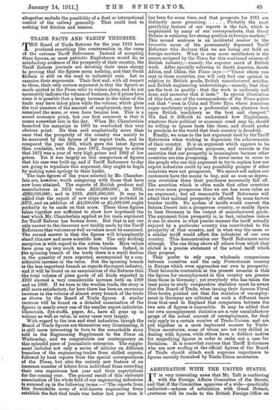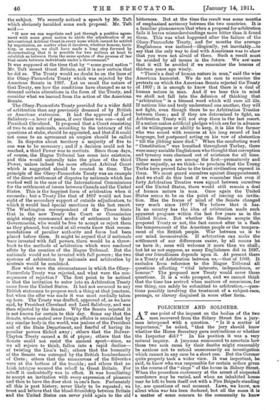ARBITRATION IV tra THE UNITED STATES.
IT is very interesting news that Mr. Taft is conferring with the Foreign Affairs Committee of the Senate, and that if the Committee approves of a wide—practically unlimited—scheme of arbitration with Great Britain, overtures will be made to the British Foreign Office on the subject. We recently noticed a speech by Mr. Taft which obviously heralded some such proposal. Mr. Taft said :— " If now we can negotiate and put through a positive agree- ment with some great nation to abide the adjudication or international Arbitral Court in every issue which cannot be settled by negotiation, no matter what it involves, whether honour, terri- tory, or money, we shall have made a long step forward by demonstrating that it is possible for two nations at least to establish as between them the same system of due process of law that exists between individuals under a Government."
It was supposed at the time that by " some great nation " Mr. Taft meant Great Britain, and it is now certain that he did so-. The Treaty would no doubt be on the lines of the Olney-Pauncefote Treaty which was rejected by the American Senate in 1897. Let us recall the nature of that Treaty, see how the conditions have changed so as to demand certain alterations in the form of the Treaty, and consider what we learned from the action of the American Senate.
The Olney-Pauncefote Treaty provided for a wider field of arbitration than any previously dreamed of by British or American statesmen. It had the approval of Lord Salisbury—a lover of peace, if ever there was one—and of President Cleveland. It proposed that a Court consisting of two to six nationals, according to the intricacy of the questions at stake, should be appointed, and that if it could not come to an agreement an umpire should be called in. In disputes about territory a majority of five to one was to be necessary ; and if a decision could not be reached, a third Power was to mediate. Since those days, of course, the Hague Tribunal has come into existence, and this would naturally take the place of the third Power, unless indeed the more efficient Arbitral Court which is suggested should be created in time. The principle of the Olney-Pauncefote Treaty was an example of the direct settlement of disputes by nationals which has worked well in the case of the International Commissions for the settlement of issues between Canada and the United States. This is the happiest form of arbitration when it succeeds ; but a Treaty like that of 1897 would not lose sight of the secondary support of outside adjudicators, to which it would lend special sanctions in the last resort. The Washington correspondent of the Times hints that in the new Treaty the Court or Commission might simply recommend modes of settlement to their Governments, who would be free to accept or reject them as they pleased, but would at all events know that recom- mendations of peculiar authority and force had been placed before them. It might be argued that if nationals were invested with full powers, there would be a throw- back to the methods of arbitration which were rendered effete by the creation of the Hague Tribunal. But the nationals would not be invested with full powers ; the two systems of arbitration by nationals and arbitration by neutrals would be combined.
Now what were the circumstances in which the Olney- Pauncefote Treaty was rejected, and what were the con- sequences of rejection ? The first point to be noticed is that the invitation to enter into an Arbitration Treaty came from the United States. It had not occurred to any British statesman to propose such a thing at that juncture, but when the offer was made it was most cordially taken up here. The Treaty was drafted, approved of, as we have said, by President Cleveland and Lord Salisbury, and was then rejected by the Senate. Why the Senate rejected it is not known for certain to this day. Some say that the Senate, whose control over foreign affairs is unmatched by any similar body in the world, was jealous of the President and of the State Department, and fearful of having its peculiar powers filched away ; others that the Bulwer- Clayton Treaty caused a fit of pique; others that the Senate could not resist the ancient sport--since, as we all rejoice to think, fallen into a rapid decline— of twisting the Lion's tail ; others that the humanity of the Senate was outraged by the British bombardment of Crete ; others that the manoeuvres of the Silverites were at the bottom of the trouble ; and others that an Irish intrigue secured the rebuff to Great Britain. For rebuff it undoubtedly was in effect. It was humiliating to accept an invitation with every expression of pleasure and then to have the door shut in one's face. Fortunately all this is past history, never likely to be repeated ; we trust and believe that the blood-friendship between Britain and the United States can never yield again to the old bitterness. But at the time the result was some months of emphasised acrimony between the two countries. It is a familiar phenomenon that when a proposal for arbitration fails it leaves misunderstandings more bitter than it found them. This was what happened after the failure of the Olney-Pauncefote Treaty, and for months the average Englishman was inclined—illogically, yet inevitably--to say that the only way to deal with Americans was to show that you were not afraid of them. Such a. result must be avoided by all means in the future. We ariP sure that it will be avoided if we remember the lessons of thirteen years ago wisely. " There's a deal of human nature in man," said the wise American humorist. We do not care to examine the pretexts on which the American Senate rejected the Treaty of 1897 ; it is enough to know that there is a deal of human nature in man. And if we bear this in mind we shall not fall into the delusion of thinking that " arbitration " is a blessed word which will cure all ills. If nations like and truly understand one another, they will not fight, even though there be no Arbitration Treaties between them ; and if they are determined to fight, an Arbitration Treaty will not stop them in the last resort. If a nation makes artificial pledges which are far in advance of its willingness or ability to keep, it is like the farmer who was seized with remorse at his long record of bad language, but postponed acting on his vow of abstention " till the jibbing mare died." When the comforting word " Constitution" was breathed throughout Turkey, there were many amiable Englishmen who thought that corruption and tyranny were charmed out of existence for all time. These same men are among the first—prematurely and rather unjustly, as we think—to proclaim that the Young Turks have proved false to the trust civilisation reposed in them. We must guard ourselves against disappointment. And we shall do this best if we remember that even if forty Arbitration Treaties were signed between ourselves and the United States, there would still remain a deal of human nature in man. Once again the United States seems to be on the point of issuing an invita- tion. Has the frame of mind of the Senate changed very much since 1897 ? We believe that it. has. In no country has the idea of arbitration made such apparent progress within the last few years as in the United States. But whether the Senate accepts the proposed Treaty or not, the fact cannot alter in a flash the temperament of the American people or the tempera- ment of the British people. War between us is to our mind inconceivable. If arbitration can make the settlement of our differences easier, by all means let us have it ; none will welcome it more than we shall; but let us not suppose, as many Englishmen did in 1897, that our friendliness depends upon it. At present there is a Treaty of Arbitration between us,—that of 1908. It excludes from reference to the Hague Tribunal all questions affecting " vital interests, independence, or honour." The proposed new Treaty would cover those questions. It is a wide prospect, and we cannot think that the time has arrived when matters of conscience, for one thing, can safely be submitted to arbitration,—ques- t ons possibly involving the treatment of a subject-race, peonage, or slavery disguised in some other form.







































 Previous page
Previous page